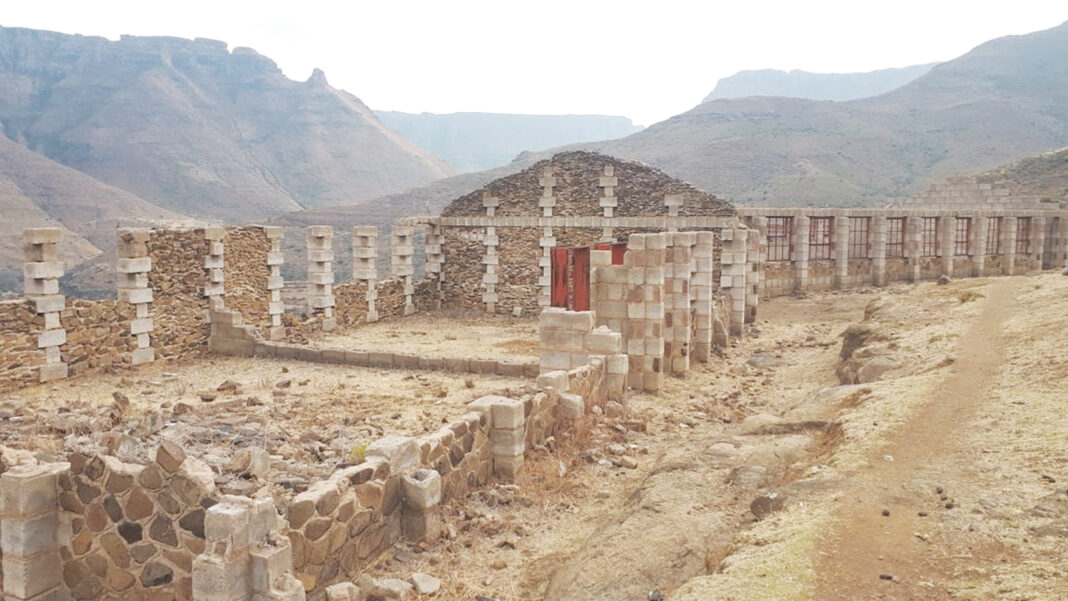By Neo Kolane
The harsh and untenable conditions of learning in marginalised rural communities once again came under the spotlight with the recent revelation that pupils at Molatjeng Primary School at Semonkong some 114km south-east of the capital Maseru, are forced to flock in a derelict hut that serves as a classroom.
This after the construction of classrooms meant to accommodate learners in a conducive facility, was abandoned midway by a contractor in 2010.
The school has a total environment of a miserly 53 pupils who take turns to use the makeshift classroom. It has only two teachers.
The plan was to build classrooms that would house pupils from Grade 1-7, with each Grade having its own classroom. Also in the plans was construction of a storeroom to harbour school property would also be constructed.
As a result, the situation is making it extremely difficult for teachers and learners to teach and study in a hut.
This is despite the government openly expressing plans to provide every child with quality education as a right. It has implemented the free primary education which began some years ago.
The school’s principal, ‘Mamahooana Kolobe, lamented the poor learning conditions which children and teachers have to endure. The thatch-roofed stone hut belongs to the local chief.
Kolobe said during inclement weather conditions, especially on rainy days, pupils are forced to stay home as rivers burst their banks.
“When the learners return to school, teachers have to re-teach the lessons taught while they were not in class,” Kolobe clearly regretted.
During his recent tour of Molatjeng Primary School, the minister of development planning Selibe Mochoboroane, promised to meet with the ministry of education and training officials to urge them to attend to the school’s unsavoury situation.
According to the Incheon Declaration Framework for Action for the implementation of Sustainable Development Goal Four, unlocking education’s power for all will require creating more opportunity everywhere, but especially in countries and regions in conflict.
The document continues to indicate that many of the largest education gaps are found in conflict and emergency situations.
“It is, therefore, critical to develop education systems that are more resilient and responsive
in the face of conflict, social unrest and natural hazards and to ensure that education is maintained during emergency, conflict and post-conflict situations.
“Better education is also central to preventing and mitigating conflicts and crises and to promoting peace,” the document states.
Lesotho Council of NGO’s (LCN) programmes director Sekonyela Mapetja says the ordeal of Molatjeng Primary is a microcosm of the hardships that afflict schools in Lesotho.
“Issues relating to education fall under LCN’s Health, Education and Social Development Commission, which also has an education advocacy forum.
“We advocate for quality and equal access to education for all especially for the vulnerable learners like those of Molatjeng Primary. We monitor the ministry of education budget allocations. We have seen low budget allocations, especially for schools’ infrastructure improvement.
“Of late, most of the schools built are either from the grants or donations from somewhere. This is why we have schools such as this one,” he observed.
Mapetja said the country has committed to implement the Sustainable Development Goal Four (SDG4) which seeks to ensure inclusive and equitable education for all. It promotes life-long learning opportunities for all.
He described the conditions under which the Molatjeng Primary School children and teachers operate as ‘appalling’, adding that there was no proper teacher-learner proportion at the facility.
He said two teachers are more than enough for 50 or 60 pupils. He was at pains to learn that one teacher has to teach more than one class, describing that as burdensome to the instructors.
“They should have 32 learners per week at most. It means in each grade they have 11 subjects that are to be taught per week; when that is multiplied by the number of grades a teacher teaches, it is beyond slavery.
“We need to measure how many learners are beyond the primary level age as in the case of Molatjeng Primary. These learners do not acquire quality education and this is a challenge that is visible,” Mapetja said.
Meanwhile, the principal secretary of the ministry of basic education and training, Dr Dira Khama, acknowledged cognizance of the school’s condition. He confirmed that Mochoboroane had talked to him about the situation.
He promised to attend to the needs of the school from this week.
IN another development, youth rights activist, Kananelo Boloetse, did not mince his words as he decried the condition of the school, which he described as ‘unacceptable’.
“Education is a basic human right, just like life itself. Every person needs to have access to education, not only that but an education that will change one’s life by equipping them to combat poverty and provide for their family. But looking at Motjaleng Primary, it’s definitely one school that cannot empower a student to combat poverty and reach their goal of living.
“Quality education would help the country produce a quality human resource base such as good doctors. The country can afford to offer proper education as long as budgetary allocations are handled efficiently. Misappropriation of funds is taking a toll on state coffers as only a few people benefit at the expense of the masses.
“The situation at Matjaleng Primary is heart-wrenching. There is money for service delivery and good education can be offered, but those in power would rather pocket state funds for their own gains. It is not acceptable that in the year 2021, we still have children who learn in such deplorable conditions,” he concluded.









